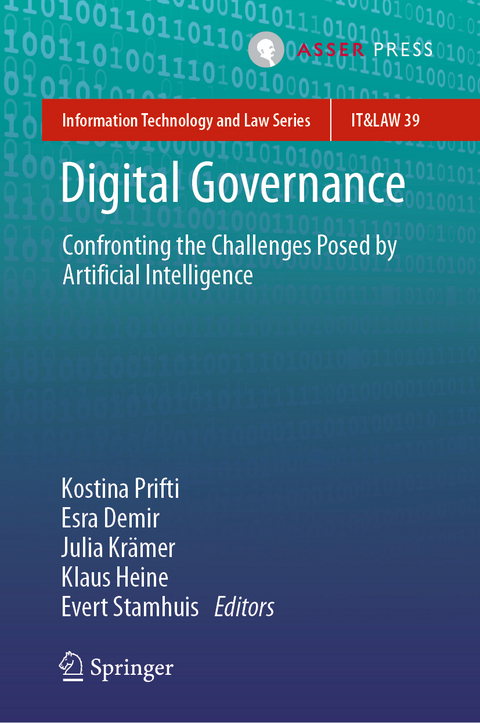
Digital Governance
T.M.C. Asser Press (Verlag)
978-94-6265-638-3 (ISBN)
- Noch nicht erschienen - erscheint am 08.01.2025
- Versandkostenfrei innerhalb Deutschlands
- Auch auf Rechnung
- Verfügbarkeit in der Filiale vor Ort prüfen
- Artikel merken
The book is valuable for audiences with or without a technological background. Primarily, it targets academic scholars from a variety of disciplines, including law, ethics, sociology, political science, economics, computer science, and engineering. Particularly, academics interested in interdisciplinary and transdisciplinary studies would benefit from the mixture of disciplines in the book. The scholarly insights in this work are valuable also for policymakers and civil society, by providing potential guidance for effective AI regulation. Additionally, the book can be useful to private companies and organisations that are involved in designing AI applications, offering practical insights and guidance about the legal and societal implications of AI.
Kostina Prifti, Esra Demir and Julia Krämer are PhD candidates at Erasmus School of Law, Rotterdam, the Netherlands.
Klaus Heine is Professor of Law and Economics at Erasmus School of Law, Rotterdam, the Netherlands.
Evert Stamhuis is Professor of Law and Innovation at Erasmus School of Law, Rotterdam, the Netherlands.
Chapters 2, 6, 10, and 13 are available open access under a via link.springer.com.
Chapter 1. Introduction.- Part I. Disruptive effects of AI.-Chapter 2. The doctor and the missing link: medical liability and causation in the age of AI.- Chapter 3. When the kids aren’t alright: the use of facial recognition technologies at school.- Chapter 4. Emotional Artificial Intelligence: Introducing the Concept of ‘Emotional Privacy’.- Chapter 5. Open banking in the EU: consumer utopia or dystopiaEugerta Muçi.- Chapter 6. Problematising user control in the context of digital identity wallets and European Digital Identity Framework.- Chapter 7. AI in the Workplace: Regulating Explainability and Consent in Algorithmic Management.- Part II. Designing legal solutions for digital governance.- Chapter 8. AI Acts' Ripple Effect on Biometric Data: Harmonising or Fragmenting the Biometric Data Regulation?.- Chapter 9. The Rule of Law for Artificial Intelligence in Public Administration: A System Safety Perspective.- Chapter 10. Towards formalizing AI readiness of standards.- Chapter 11. Regulating LegalTech: a phenomenological perspective.- Chapter 12. Codes of Conduct in the Digital Services Act: Exploring the Opportunities and Challenges.- Chapter 13. Rethinking Algorithmic Explainability Through the Lenses of Intellectual Property and Competition.- Chapter 14. Conclusions.
| Erscheinungsdatum | 18.12.2024 |
|---|---|
| Reihe/Serie | Information Technology and Law Series |
| Zusatzinfo | 4 Illustrations, color; 9 Illustrations, black and white; VIII, 302 p. 13 illus., 4 illus. in color. |
| Verlagsort | The Hague |
| Sprache | englisch |
| Maße | 155 x 235 mm |
| Themenwelt | Informatik ► Theorie / Studium ► Künstliche Intelligenz / Robotik |
| Recht / Steuern ► EU / Internationales Recht | |
| Recht / Steuern ► Öffentliches Recht | |
| Recht / Steuern ► Privatrecht / Bürgerliches Recht ► Medienrecht | |
| ISBN-10 | 94-6265-638-X / 946265638X |
| ISBN-13 | 978-94-6265-638-3 / 9789462656383 |
| Zustand | Neuware |
| Informationen gemäß Produktsicherheitsverordnung (GPSR) | |
| Haben Sie eine Frage zum Produkt? |
aus dem Bereich


